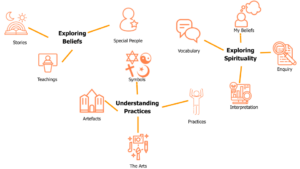Religious Education
All primary schools need to “raise the status of Religious Education” (Ofsted) and provide an RE curriculum which promotes respect and empathy. RE is considered an important part of a child’s education, especially their early education, because it allows young people to develop their beliefs and values. It helps children understand the place of religion and belief in the world. It contributes educationally to the spiritual, moral, social and cultural development of all pupils, whether or not they are from a religious background.
Our Religious Education curriculum develops essential characteristics of religiously literate pupils:
- An outstanding level of religious understanding and knowledge.
- A thorough engagement with a range of ultimate questions about the meaning and significance of existence.
- The ability to ask significant and highly reflective questions about religion and demonstrate an excellent understanding of issues related to the nature, truth and value of religion.
- A strong understanding of how the beliefs, values, practices and ways of life within any religion cohere together.
- Exceptional independence; the ability to think for themselves and take the initiative in, for example, asking questions, carrying out investigations, evaluating ideas and working constructively with others.
- Significant levels of originality, imagination or creativity, which are shown in their responses to their learning in RE.
- The ability to link the study of religion and belief to personal reflections on meaning and purpose.
- A wide knowledge and deep understanding across a wide range of religions and beliefs
How is religious education taught at Portway?
The Religious Education curriculum is designed to help pupils form a Religious Education Mental model within their long-term memories. Our religious education unit coverage provides detailed information as to how we teach all elements of the curriculum across all year groups at our school.
Schema theory states that all knowledge is organised into units. A mental model is, therefore, a conceptual system for understanding knowledge.
Our Religious Education Mental model is a way of organising Religious Education substantive and disciplinary knowledge in a meaningful way; it is an appreciation of how facts are connected and the ways in which they are connected. It is distinct from information, which is just isolated facts that have no organisational basis or links.
Big Ideas help form the basis of the mental model. Big Ideas are key concepts that underpin the subject. There are three Big Ideas in Religious Education:
- Exploring Beliefs (To know some of the teachings of the key religions. Understand some of the beliefs held in the community. Explain how some beliefs are shared between religions.
- Understanding Practices (To know the meaning and celebrations for notable festivals. To identify religious buildings and key practices followed by worshippers.)
- Exploring Spirituality (To recognise and express feelings about their own identities and relate these to religious beliefs/ teachings.)
Each Big Idea has knowledge strands which help to strengthen the mental model. Learning knowledge in each of the strands allows pupils to express and demonstrate their understanding of the Big Idea, which gradually develops as pupils return to them over and over again.

